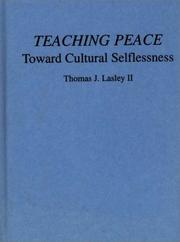| Listing 1 - 8 of 8 |
Sort by
|
Book
ISBN: 9783319583525 Year: 2017 Publisher: Basingstoke : Palgrave Macmillan,
Abstract | Keywords | Export | Availability | Bookmark
 Loading...
Loading...Choose an application
- Reference Manager
- EndNote
- RefWorks (Direct export to RefWorks)
Buddhist philosophy. --- Selflessness (Psychology) --- Watsuji, Tetsurō,
Book
ISBN: 1526648121 1526648113 Year: 2022 Publisher: London, England ; Dublin, Ireland : Bloomsbury Publishing,
Abstract | Keywords | Export | Availability | Bookmark
 Loading...
Loading...Choose an application
- Reference Manager
- EndNote
- RefWorks (Direct export to RefWorks)
Selflessness (Psychology) --- Success in business. --- Self-interest.
Book
ISBN: 1633693430 Year: 2018 Publisher: Boston, Massachusetts : Harvard Business Review Press,
Abstract | Keywords | Export | Availability | Bookmark
 Loading...
Loading...Choose an application
- Reference Manager
- EndNote
- RefWorks (Direct export to RefWorks)
Most leaders think they're effective at motivating their employees, but study after study shows that employees are more disengaged and uninspired than ever. The solution lies not in more management training or fun off-sites but in looking within--into the mind of the leader. Based on their years-long research and practice, Rasmus Hougaard and Jacqueline Carter, of the Potential Project, have conclusively found that three qualities stand out as being foundational for leaders today: mindfulness, selflessness, and compassion--what they call the MSC Leadership Mind, the ideal mind of the leader. Mindfulness addresses the distractedness that kills our focus, stunts our productivity, and makes us action-addicted multitaskers. Selflessness addresses the general lack of fulfillment in work life by helping us--and the people we lead--find true happiness and meaning. And compassion addresses today's social disintegration by enhancing true human connections, followership, and engagement. While some think these traits are innate, Hougaard and Carter, together with hundreds of their associates working with thousands of leaders around the world, have developed a system to help leaders of all kinds learn and cultivate the MSC Leadership Mind. By addressing their own needs first, then those of their people, and finally the culture of their organization, every leader can learn to embody what makes for great leadership in today's challenging organizational environment.--
Leadership --- Mindfulness (Psychology) --- Selflessness (Psychology) --- Compassion. --- Psychological aspects.
Book
ISBN: 9781633693432 1633693430 Year: 2018 Publisher: Boston, Massachusetts : Harvard Business Review Press,
Abstract | Keywords | Export | Availability | Bookmark
 Loading...
Loading...Choose an application
- Reference Manager
- EndNote
- RefWorks (Direct export to RefWorks)
Most leaders think they're effective at motivating their employees, but study after study shows that employees are more disengaged and uninspired than ever. The solution lies not in more management training or fun off-sites but in looking within--into the mind of the leader. Based on their years-long research and practice, Rasmus Hougaard and Jacqueline Carter, of the Potential Project, have conclusively found that three qualities stand out as being foundational for leaders today: mindfulness, selflessness, and compassion--what they call the MSC Leadership Mind, the ideal mind of the leader. Mindfulness addresses the distractedness that kills our focus, stunts our productivity, and makes us action-addicted multitaskers. Selflessness addresses the general lack of fulfillment in work life by helping us--and the people we lead--find true happiness and meaning. And compassion addresses today's social disintegration by enhancing true human connections, followership, and engagement. While some think these traits are innate, Hougaard and Carter, together with hundreds of their associates working with thousands of leaders around the world, have developed a system to help leaders of all kinds learn and cultivate the MSC Leadership Mind. By addressing their own needs first, then those of their people, and finally the culture of their organization, every leader can learn to embody what makes for great leadership in today's challenging organizational environment.--
E-books --- Leadership --- Mindfulness (Psychology) --- Selflessness (Psychology) --- Compassion. --- Psychological aspects.
Book
ISBN: 1622737563 9781622737567 9781622736393 1622736397 Year: 2019 Publisher: Wilmington, Delaware ; Malaga, Spain : Vernon Press,
Abstract | Keywords | Export | Availability | Bookmark
 Loading...
Loading...Choose an application
- Reference Manager
- EndNote
- RefWorks (Direct export to RefWorks)
Selflessness (Psychology) --- Lack of self (Psychology) --- Psychology, Pathological --- Leadership --- Psychological aspects --- E-books

ISBN: 0300056532 Year: 1993 Publisher: New Haven (Conn.): Yale university
Abstract | Keywords | Export | Availability | Bookmark
 Loading...
Loading...Choose an application
- Reference Manager
- EndNote
- RefWorks (Direct export to RefWorks)
Psychoanalysis --- Psychotherapist and patient --- Selflessness (Psychology) --- Case studies --- Jackson, Grace, --- Nakhla, Fayek,

ISBN: 0897893719 Year: 1994 Publisher: Westport ; London Bergin & Garvey
Abstract | Keywords | Export | Availability | Bookmark
 Loading...
Loading...Choose an application
- Reference Manager
- EndNote
- RefWorks (Direct export to RefWorks)
Book
ISBN: 9780198765868 Year: 2016 Publisher: Oxford Oxford University Press
Abstract | Keywords | Export | Availability | Bookmark
 Loading...
Loading...Choose an application
- Reference Manager
- EndNote
- RefWorks (Direct export to RefWorks)
In an age of self-affirmation and self-assertion, 'selfless love' can appear as a threat to the lover's personal well-being. This perception jars with the Biblical promise that we gain our life through losing it and therefore calls for a theological response. In conversation with the Protestant theologian Paul Tillich and the atheistic moral philosopher and novelist Iris Murdoch, Selfless Love and Human Flourishing in Paul Tillich and Iris Murdoch enquires into the anthropological grounds on which selfless love can be said to build up, rather than undermine, the lover's self. It proposes that while the implausibility of selfless love was furthered by the modern deconstruction of the self, both Tillich and Murdoch utilize this very deconstruction towards explicating and restoring the link between selfless love and human flourishing. Julia T. Meszaros shows that they use the modern diagnosis of the human being's lack of a stable and independent self as manifest in Sartre's existentialism in support of an understanding of the self as relational and fallen. This leads them to view a loving orientation away from self and a surrender to the other as critical to the full flourishing of human selfhood. In arguing that Tillich and Murdoch defend the link between selfless love and human flourishing through reference to the human being's ontological selflessness, Meszaros closely engages Søren Kierkegaard's earlier attempt to keep selfless love and human flourishing in a productive, dialectical tension. She also examines the breakdown of this tension in the later figures of Anders Nygren, Simone Weil, and Jean-Paul Sartre, and addresses the pitfalls of this breakdown. Her examination concludes by arguing that the link between selfless love and human flourishing would be strengthened by a more resolute endorsement of a personal God, and of the reciprocal nature of selfless love.
| Listing 1 - 8 of 8 |
Sort by
|

 Search
Search Feedback
Feedback About UniCat
About UniCat  Help
Help News
News